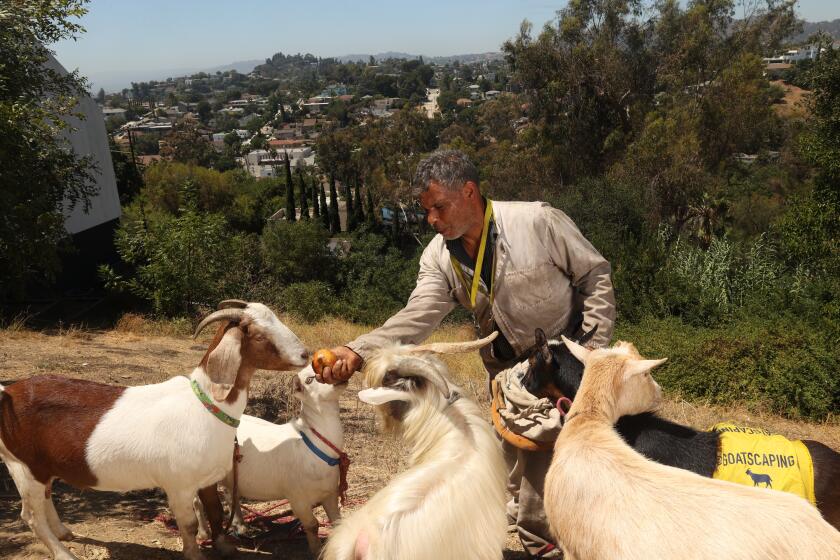Pet Owners Tune In to What Animals Have on Their Minds
P arlez-vous poodle?
If not, perhaps your linguistic skills lean toward smaller breeds. Se habla Chihuahua? Sprechen Sie Schnauzer?
Fear not if chatting with canines is beyond you. Maureen Hall will show you the way.
Hall, a professional animal trainer, teaches a class titled: “Telepathic Communication with Animals: Yes You Can & We’ll Teach You How.” The one-day, three-hour course is offered every few months at Everywoman’s Village, a nonprofit arts and education center in Van Nuys.
On a recent Saturday afternoon, Hall and seven students gathered in a sweltering dance rehearsal room to commune, and to communicate, with nature. In ages past, Hall somberly told her students, people would be “burned at the stake for even suggesting such a thing as this.”
Hall may not be tried for witchcraft, but some might find her line heretical, if not off the wall. “It’s great to know you are capable of communicating to another species,” she enthused.
Indeed, before the day was done, the students appeared to have exchanged thoughts with two Amazon parrots, a Chihuahua named Chico and various dogs and cats they had left at home. That, at least, is what the students said.
The goal was to speak with animals, not like them. This is no Berlitz in Beagle, and the students did not chant stock canine phrases like “Let’s go for a walk,” “Feed me” or “Oops, sorry about the rug.”
Instead, by employing meditation and breathing exercises to calm and clear their minds, they mentally directed questions at animals and then tried to receive words or images in reply.
Dr. Doolittle learns transcendental meditation.
This explanation considerably simplifies Hall’s lecture, which included a discussion of animal behavior and brain waves. She also warned that telepathy will not correct all animal behavior problems, but it may deepen your understanding of your pet. Fido may persist in digging up the rose bed, but at least you can ask why he likes to make a mess.
Cats may still ignore you but on a higher plane of consciousness.
Hall flicked on a tape recorder and a man’s voice asked students to close their eyes and visualize various numbers at his command. “You are now at Level One,” he said after a few exercises. “You are now at a deeper level of mind.”
The tape also played the “alpha sound,” an incessant and seductive patter, like sticks softly striking a snare drum. “See a giant ball of white light, pure white light, overhead,” Hall said. “Allow your head to open and feel the light filling you. . . .”
After many minutes, Hall told the students to open their eyes. They were relaxed, peaceful. And ready. At the front of the classroom, two parrots, Salome and Captain Crunch, perched on blue stands.
“OK,” Hall said. “Let’s start with the bird on the far side and ask her what she likes about being a bird.”
Pat Rudin, a chemical co-dependency therapist from Westwood, made the first guess. “That she’s beautiful.”
“She likes peanuts,” said Paul Weisfield, a salesman from Studio City.
“Eating in general,” added JoAnne Bentley, an insurance underwriter from North Hollywood.
Salome thoughtfully licked her toes.
They asked more questions, but with limited results. Some animals just don’t like to talk, Hall said. She recalled meeting a rabbit who initially rebuffed her chatty overture, but finally sniffed: “You would really rather talk to horses. You really don’t respect us.”
He was right, Hall said. She is really more of a horse person, but she persisted and eventually she and the rabbit had a frank talk about a brain hemorrhage she had suffered.
Hall also announced that it is possible to order ants out of your house, if you show respect and ask politely.
Miriam Schneider, who does publicity for Everywoman’s Village, brightened at the thought.
“Have you tried termites?” she asked hopefully.
“No.”
“Could you come to my house?”
Hall admitted that animal telepathy sounds crazy. But too many students have correctly said things about her animals, things only she and the animal would know, she said. Soon students appeared to be doing just that.
Hall told the class to ask the male bird, Captain Crunch, what he had done the day before.
Some closed their eyes to concentrate.
Finally Bentley asked: “Did you give him a bath or shower yesterday?”
“That’s what I got too,” blurted Shelley Saperstein, an insurance adjuster.
“You took him and showed him off yesterday,” added Marty Rudin, Pat’s husband.
Hall was smiling now. “They performed in a circus,” Hall said. “You people are on a roll.” And yes, she said, the birds had taken a bath the day before. When Hall asked if Captain Crunch had been born in the jungle or captivity, the students said the bird reacted emotionally and with sadness. He longed for his jungle home, they said. “I saw him in a jungle,” Marty Rudin told his wife, surprised at his own words. “It’s weird.”
The students then turned their thoughts toward the animals they had left at home that day.
Beverly Santana, office manager for a Northridge synagogue, tried to place a telepathic call to her cat but found her feline was off the hook.
“I got the feeling I was waking him up,” she said.
Santana had brought another of her pets to class, the Chihuahua named Chico, carrying him like an elegant clutch handbag. As a final exercise, the class asked Chico to describe his favorite toys.
Eyes closed again. “Hairbrush or something with spines,” Saperstein said with uncertainty. She tried again, concentrating until the image focused in her mind. “Hair rollers?”
“Oh, my god,” Santana said. “He has perm rods he plays with.”


